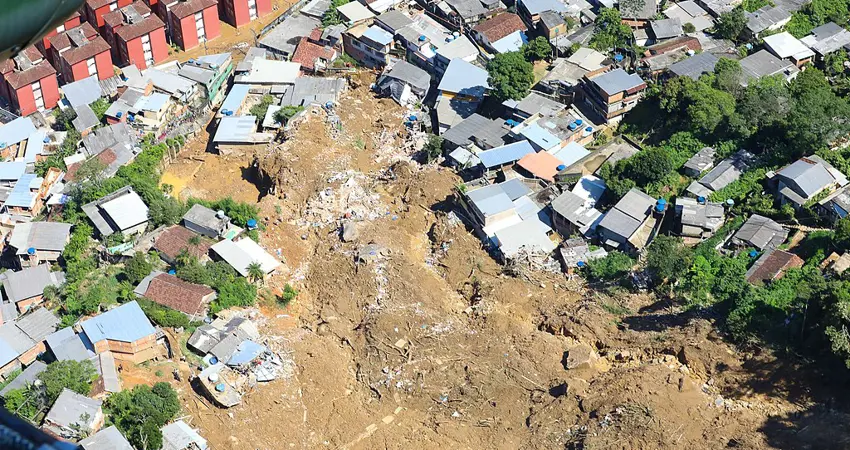15 Aug 2022
New research project aims to assess the role of climate change on landslides in Brazil
Project workshop in September 2022 will focus specifically on two or three notable landslide-triggering heavy precipitation events in Brazil

In February 2022, intense rainfall in Petrópolis, Rio de Janeiro, Brazil caused mudslides and flooding that destroyed parts of the city. Palácio do Planalto from Brasilia, Brasil, CC BY 2.0 <https://creativecommons.org/licenses/by/2.0>, via Wikimedia Commons
Landslides can cause extensive damage to the built environment, cost human lives and monetary loss. Heavy precipitation not only can trigger landslide occurrence, but also could turn landslides into highly destructive debris flows. When debris materials are shifted downstream through the river channels, they could further cause increased flooding and disruptions in lowland regions and downstream agricultural lands. The impacts of landslides vary in space and time and can quickly exceed local capacity to deal with. The question of the role anthropogenic climate change plays in the rising number of landslides (especially in the densely populated regions of Brazil) remains unanswered.
A new research project called ASLIP (Attribution and Synopsis of Landslide Impacts from Precipitation), part of the Climate Science for Service Partnership Brazil, is being led by Dr Sarah Sparrow, Oxford e-Research Centre, along with the Centre’s new researcher Yuexiao Liu.
Dr Sparrow says, "We are delighted to welcome Yuexiao Liu to the team. Yuexiao will be undertaking research on current landslide metrics in Brazil with the aim of developing regionally specific metrics for use in further studies. She will also be evaluating the ability of climate models to reproduce these metrics.”
An 'Attribution and Impacts' workshop in September 2022 will focus specifically on two or three notable landslide-triggering heavy precipitation events in Brazil. The change in occurrence and/or intensity of heavy precipitation due to anthropogenic climate change will be assessed and the impacts associated with these events quantified. The project is part of the Climate Science for Service Partnership Brazil (CSSP Brazil). The ASLIP workshop follows on from a previous workshop on extreme event attribution and impacts run by the University of Oxford, Met Office and CEMADEN, which aimed to assess influence of climate change on the 2020 Minas Gerais extreme rainfall event.
Dr Sparrow adds, “We are all really looking forward to holding another Attribution and Impacts Workshop in September together with colleagues at the National Early Warning and Monitoring Centre of Natural Disaster in Brazil (CEMADEN), the University of Sao Paulo and the Met Office. These workshops have proven to be a rewarding experience for all involved."
Launched in 2016, the Climate Science for Service Partnership Brazil (CSSP Brazil) aims to build strong partnerships between research institutes in the UK and Brazil, and produce collaborative science that is fundamental to the development of climate services that support climate-resilient economic development and social welfare.
The partnership provides grants to support researchers from the UK climate science community in their work with Brazilian research institutes. CSSP Brazil is part of the Weather and Climate Science for Service Partnership (WCSSP) programme supported by the UK Government’s Newton Fund.





